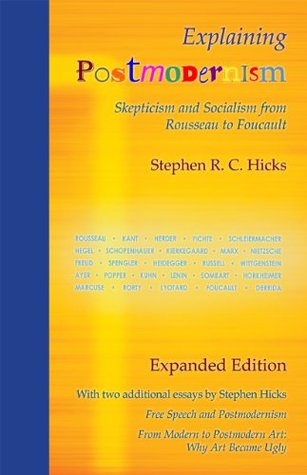More on this book
Community
Kindle Notes & Highlights
Read between
July 20 - August 12, 2021
In effect, by the late 1950s and early 1960s, significant portions of the Left came to agree with the collectivist Right on yet another issue: Forget internationalism, universalism, and cosmopolitanism; focus on smaller groups formed on the basis of ethnic, racial, or other identities.
In effect, this strain of Left thought came to agree with what the collectivist Right had long argued: that human beings are not fundamentally rational—that in politics it is the irrational passions that must be appealed to and utilized.
We are constructed socially, the postmoderns argue, and we are, even as adults, not aware of the social construction that underlies the speech we are engaging in. We might feel as though we are speaking freely and making our own choices, but the unseen hand of social construction is making us what we are. What you think and what you do and even how you think are governed by your background beliefs.
As a result of this, the postmoderns infer there is no distinction between speech and action, a distinction that liberals have traditionally prized. According to postmodernists, speech is itself something that is powerful because it constructs who we are and underlies all of the actions that we engage in. And as a form of action, it can and does cause harm to other people. Liberals, say postmodernists, should accept that any form of harmful action must be constrained. Therefore, they must accept censorship.
Another consequence of this view is that group conflict is inevitable, for different groups are constructed differently according to their different linguistic and social backgrounds. Blacks and whites, men and women, are constructed differently and those different linguistic-social-ideological universes will clash with each other. Thus, the speech of the members of each group is seen as a vehicle through which the groups’ competing interests clash. And there will be no way of resolving the clash, because from this perspective you cannot say, “Let’s settle this reasonably.” What reason is, is
...more
The postmoderns say: Speech is a weapon in the conflict between groups that are unequal. And that is diametrically opposed to the liberal view of speech, which says: Speech is a tool of cognition and communication for individuals who are free.
The postmodern argument implies that if anything goes, then that gives permission to the dominant groups to keep on saying the things that keep the subordinate groups in their place. Liberalism thus means helping the silencing of the subordinate groups and letting only the dominant groups have effective speech. Postmodern speech codes, therefore, are not censorship but a form of liberation—they liberate the subordinated groups from the punishing and silencing effects of the powerful groups’ speech, and they provide an atmosphere in which the previously subordinated groups can express
...more
Postmodernism, as a fairly consistent philosophical outlook, presupposes a social subjectivist epistemology, a social-determinist view of human nature, and an altruistic, egalitarian ethic. Speech codes are a logical application of those beliefs.
We have the capacity to think or not. But that capacity can be hampered severely by a social atmosphere of fear. That is an indispensable part of the liberal argument. Censorship is a tool of government: the government has the power of force to achieve its end, and depending on how that force is used it can generate an atmosphere of fear that interferes with an individual’s ability to perform the basic cognitive functions he needs to act responsibly in the world.
the only way that they can make an informed choice is if there is much discussion and much vigorous debate. So, free speech is an essential part of maintaining democracy.
History teaches us to worry about the abuse of government power,


